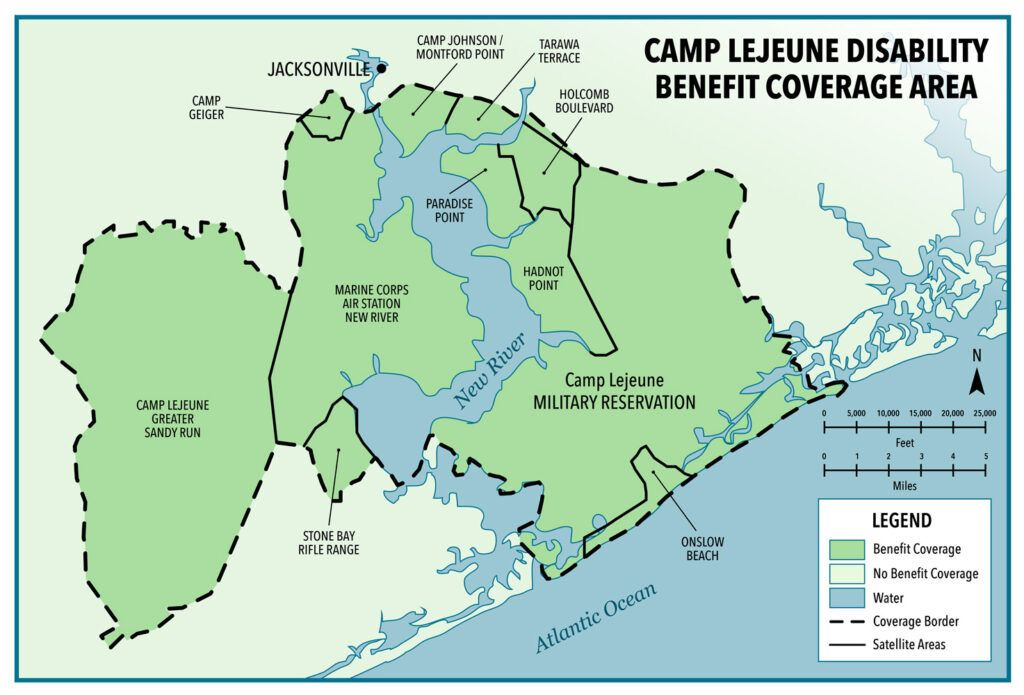🚱Camp Lejeune Toxic Water Exposure Lawsuit

Camp Lejeune Contaminated Water Update July 2022
Veterans, civilian employees, and family members who worked or lived at Camp Lejeune from 1953 to 1987.
In June 2022, the U.S. government passed the Camp Lejeune Justice Act of 2021, which was part of the Honoring Our Promise to Address Comprehensive Toxics (PACT) Act. The Honoring Our PACT Act focuses on addressing issues that affect veterans who were exposed to toxic materials during service.
Because of this new law, those who were exposed can now seek compensation by filing a Camp Lejeune lawsuit after having been denied justice for so many years.
Did you or a loved one serve, live, or work on US Marine Corps Base Camp Lejeune, North Carolina from August 1, 1953 - December 31, 1987?
Marine Corps Base Camp Lejeune is the site of one of the worst water contamination cases in US history. The base was a frequent pollution spot where oil, wastewater, and toxic chemicals used as degreasers and solvents were all knowingly dumped in the local storm drains between 1952 and 1987, contaminating the local water supply for 35 years.
Individuals who were exposed to contaminated water at Camp Lejeune for at least 30 days between August 1, 1953, and December 31, 1987, can sue for damages if they have been diagnosed with any of the following diseases:
Adult leukemia
Aplastic anemia and other myelodysplastic syndromes
Bladder cancer
Kidney cancer
Liver cancer
Multiple myeloma
Non-Hodgkin's lymphoma
Parkinson's disease
From 2011 to 2022, the VA has granted 18,910 Camp Lejeune water contamination claims and denied 90,427 others for an overall approval rate of 17%. Approximately 2,443 claims are still pending, and many Veterans have died from their service-related medical conditions while waiting for their claims to be approved.
The VA presumes these 8 diseases are connected to service at Camp Lejeune, so Veterans with these conditions should automatically be eligible for disability benefits. Veterans, their family members, and nearby civilians may also be eligible to file lawsuits against the U.S. government under H.R. 6482 to reclaim damages caused by the diseases listed above.
The base and the surrounding community are home to active duty, dependent, retiree, and civilian employee population of nearly 150,000 people. The base generated almost $3 billion in commerce each year.
It has been reported that at least 900,000 military personnel and their family members were stationed at the United States Marine Corps Base Camp Lejeune between 1953 and 1987.
It has been reported that at least 900,000 military personnel and their family members were stationed at the United States Marine Corps Base Camp Lejeune between 1953 and 1987.
If you or your loved ones developed a serious illness and were at Camp Lejeune for more than 30 days between 1953 and 1987
FAQ
What was wrong with the water at Camp Lejeune?
Two on-base water wells were found to have the chemicals trichloroethylene (TCE), perchloroethylene (PCE), benzene, vinyl chloride and other compounds.
Do I lose out on my VA benefits if I report my injury?
You are still entitled to your VA benefits if you report your injuries and fulfill a case.
Disclaimer: Some information on this site may be considered attorney advertising under your state’s laws and ethical rules. This legal news site and its content is for general information only and is not legal advice. Information on this site may be incomplete or out-of-date.
No attorney-client relationship is created between you and any attorney who publishes content or online forms on this site. Hiring a lawyer is an important decision that should not be based solely on advertisements.









